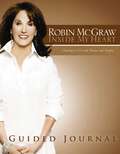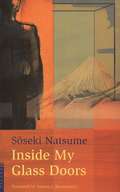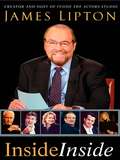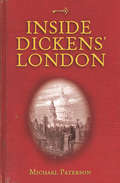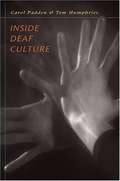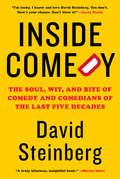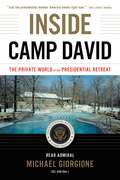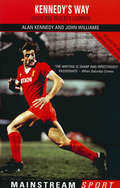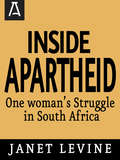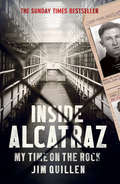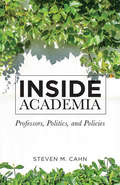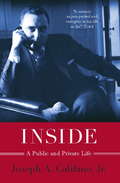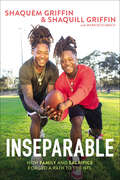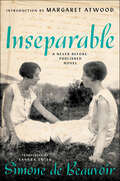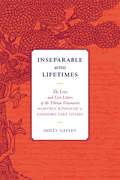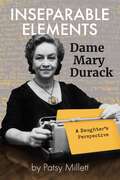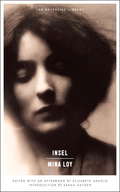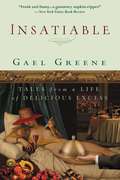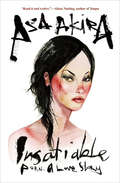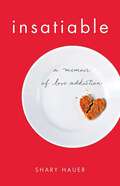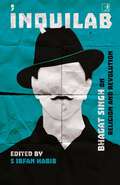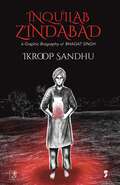- Table View
- List View
Inside My Heart Guided Journal: Choosing to Live With Passion and Purpose (Thorndike Core Ser.)
by Robin Mcgraw"Reflect on the life you've lived thus far. And on the life you are living now. This is what this guided journal is all about?to make a choice to put yourself first and to make the time to think about and create the life you want."A woman loves to share her heart?and in this guided journal based on her bestselling book, Inside My Heart: Choosing to Live with Passion and Purpose, Robin McGraw speaks directly from her heart, challenging you to recognize and develop your own unique role in life and make your own choices to find who you are meant to be.In a heart-to-heart conversational tone, Robin shares moments from her own life to show how you can make choices that truly reflect your own heart's truest priorities and highest goals. Her thought-provoking questions then inspire you to define your own purpose and passion in life, as well as choosing how to:Have a confident, discerning heartSet prioritiesChoose wiselyDraw on your inner strengthsRobin also offers candid, personal examples of how to set boundaries, live with grace and integrity, and leave a legacy of love for the important people in your world.Her Inside My Heart Guided Journal encourages you to make deliberate, knowledgeable choices in order to lead a richer, happier, and more meaningful life. Robin's encouraging words will give you the confidence to embrace your own life of joy and abundance.
Inside My Glass Doors
by Natsume Soseki Sammy I. TsunematsuOriginally published as Garusudo no Uchi in daily serialization in the Asahi newspaper in 1915, before appearing in book form, this is the first time Inside My Glass Doors has been published in English. It is a moving literary reminiscence, a collection of thirty-nine autobiographical essays penned a year before the author's death. Written in the genre of shohin (little items), the personal vignettes provide a kaleidoscopic view of Natsume Soseki's private world and shed light on his concerns as a novelist.Readers are at once ushered into Soseki's book-lined study, in his residence in Kikui-cho, as he muses on his present situation and reflects on the past. The story is filled with flashbacks to Soseki's youth-his classmates, his family, and his old neighborhood-as well as episodes from the more recent past, all related in considerable detail. There are his characteristic ruminations about his physical well-being, and from the quiet spaces inside the glass doors of his study, he also calmly observes the clamorous state of the world outside. The essays in this book, crafted with extraordinary subtlety and psychological depth, reflect the work of a great author at the height of his powers.
Inside Inside
by James Lipton"An unqualified hit" (Library Journal) that offers behind-the-scenes close-ups of hundreds of celebrated artists- from the founder and host of Inside the Actors Studio.
Inside Dickens' London
by Michael PatersonThis is a fascinating, evocative account of 19th-century London, so well known from Charles Dickens' much-loved novels. It draws on descriptions of life in the capital from original letters, diaries and newspapers, as well as Dickens' own social commentary, to paint a vivid portrait of a city undergoing massive social changes. No author has ever described the city of London as well as Dickens. His eye for detail and his gift for characterization moved and entertained readers throughout the world who might never have been to the city. Many of the cliches that crowd our imaginations when we think of London, or of the Victorians, can be traced back to his writings. A unique gazetteer section with a modern-day map allows the reader to discover where places and attractions mentioned in the text can be seen in today's London.
Inside Deaf Culture
by Tom Humphries Carol Padden<P>In this [account] of the changing life of a community, the authors of Deaf in America reveal historical events and forces that have shaped the ways that Deaf people define themselves today. Inside Deaf Culture relates Deaf people's search for a voice of their own, and their proud self-discovery and self description as a flourishing culture. <P>Padden and Humphries show how the nineteenth-century schools for the deaf, with their denigration of sign language and their insistence on oralist teaching, shaped the lives of Deaf people for generations to come. They describe how Deaf culture and art thrived in mid-twentieth-century Deaf clubs and Deaf theater, and they profile controversial contemporary technologies. <P> Most triumphant is the story of the survival of the rich and complex American Sign Language long misunderstood but finally recognized by a hearing world that could not conceive of language in a form other than speech. In a moving conclusion, the authors describe their own very different pathways into the Deaf culture, and reveal the confidence and the anxiety of the people of this tenuous community as it faces the future.
Inside Comedy: The Soul, Wit, and Bite of Comedy and Comedians of the Last Five Decades
by David SteinbergThe world of comedy and comedians of the last five decades. By the man the New York Times calls "a comic institution himself," the only comedian (twenty-six years in stand-up) to have made Elie Wiesel laugh, as well as having appeared on The Tonight Show (140 times, second only to Bob Hope, but who's counting). From the director of TV comedy series Mad About You, Seinfeld, Friends, Weeds and Curb Your Enthusiasm. Larry David: &“I&’m lucky. I know and love David Steinberg. You don&’t. Now's your chance. Don&’t blow it!" &“David has always been a comedy hero to me. One of his many gifts is the ability to inspire funny people to be even funnier, as you will discover in this truly hilarious, insightful book.&” --Martin Short From David Steinberg, a rabbi's son from Winnipeg, Canada, who at age fifteen enrolled at Hebrew Theological College in Chicago (the rabbinate wasn't for him) and four years later, entered the master's program in English literature at the University of Chicago, until he saw Lenny Bruce, the "Blue Boy" of Comedy, the coolest guy Steinberg had ever seen, and joined Chicago's Second City improvisational group, becoming, instead, the comedian's comedian, director, actor, working with, inspired by, teaching, and learning from the most celebrated, admired, complicated comedians, then and now--a funny, moving, provocative, insightful look into the soul, wit, and bite of comedy and comedians--a universe unto itself--of the last half-century.From the greats: George Burns, Lenny Bruce, Sid Caesar, Lucille Ball, Mel Brooks, and Carl Reiner, et al., to the newer greats: Carol Burnett, Steve Martin, Lily Tomlin, Billy Crystal, Bob Newhart, and the man for all comedy, Martin (Marty) Short; to the greats of right now: Chris Rock, Dave Chappelle, Julia Louis-Dreyfus, Wanda Sykes; and more . . .Steinberg, through stories, reminiscences, tales of directing, touring, performing, and, through the comedians themselves talking (from more than 75 interviews), makes clear why he loves comedy and comedians who have been by his side in his work, and in his life, for more than sixty years. Here are: Will Ferrell, Eric Idle, Whoopi Goldberg, Mike Myers, Groucho himself and the greatest of them all (at least of the last half century), Jonathan Winters . . .
Inside Camp David: The Private World of the Presidential Retreat
by Michael GiorgioneThe first-ever insider account, timed to the 75th anniversary of Camp DavidNever before have the gates of Camp David been opened to the public. Intensely private and completely secluded, the president's personal campground is situated deep in the woods, up miles of unmarked roads that are practically invisible to the untrained eye. Now, for the first time, we are allowed to travel along the mountain route and directly into the fascinating and intimate complex of rustic residential cabins, wildlife trails, and athletic courses that make up the presidential family room. For seventy-five years, Camp David has served as the president's private retreat. A home away from the hustle and bustle of Washington, this historic site is the ideal place for the First Family to relax, unwind, and, perhaps most important, escape from the incessant gaze of the media and the public. It has hosted decades of family gatherings for thirteen presidents, from Franklin D. Roosevelt to Barack Obama, including holiday celebrations, reunions, and even a wedding. But more than just a weekend getaway, Camp David has also been the site of private meetings and high-level summits with foreign leaders to foster diplomacy. Former Camp David commander Rear Admiral Michael Giorgione, CEC, USN (Ret.), takes us deep into this enigmatic and revered sanctuary. Combining fascinating first-person anecdotes of the presidents and their families with storied history and interviews with commanders both past and present, he reveals the intimate connection felt by the First Families with this historic retreat.
Inside Bob Paisley's Liverpool: Kennedy's Way
by John WilliamsMany years have now passed since the greatest period of European dominance by any English football club came to an end. Between 1977 and 1984, Liverpool won the European Cup an unprecedented four times and established themselves as the number-one team in Europe. It was during the successful European Cup campaigns of 1981 and 1984 that the unlikely figure of Alan Kennedy came to dominate the headlines.Folk-hero left-back Alan Kennedy - nicknamed 'Barney Rubble' by fans after The Flintstones character due to his straightforward, no-frills approach to the game - scored the winning goal in the 1981 European Cup final against Real Madrid, as well as the nerve-twanging winning shoot-out penalty against AS Roma in 1984, a feat which secured his position in European football history.Kennedy's Way examines Kennedy's footballing career under manager Bob Paisley (and, later, under Joe Fagan) and provides a retrospective account of Liverpool's dominance during those years. Drawing on Kennedy's memories of the period, as well as those of other players and backroom staff involved with the Reds at that time, it is an irreverent, revealing account of the dressing-room culture at the club while it was at the height of its powers.The book concludes with reflections on Kennedy's post-playing life and on the trajectory of Liverpool since the Heysel and Hillsborough tragedies, in 1985 and 1989 respectively, right up to recent events at the club, including the exit of Gérard Houllier and the team's dramatic return to the pinnacle of European club football under new manager Rafael Benítez.
Inside Apartheid: One Woman’s Struggle In South Africa
by Carolyn Forché Janet LevineIn Inside Apartheid, South Africa born Janet Levine recounts the horrors of the struggles against the minority white government's brutal system of repression from a rare perspective--that of a white woman who worked within the system even as she fought to transform it.With candor and courage, Levine skillfully interweaves her personal story of a privileged white citizen's growing awareness of the evils of apartheid with a moving account of the increasing violence in and radical polarization of South Africa.Inside Apartheid brings to life both the unsurpassed physical beauty and the institutionalized brutality of the country Levine loves so deeply. We accompany her on a daring trip to the devastated black township of Soweto immediately following the unrest in 1976, on a visit to a home of a "colored" family with no way out of apartheid induced poverty, on a journey through the "black" homelands where Levine discovers firsthand the horrifying evidence of the long-term genocide of three million people.As a student activist, as a journalist, and as an elected member of the Johannesburg City Council, Levine openly attacked the government's policies in hundreds of speeches and articles, led election campaigns for one of her mentors, member of Parliament Helen Suzman, was associated with Steve Biko and other less internationally famous but equally important South African figures. Levine was a founding member of the first black taxi co-operative in South Africa, and instrumental in having hundreds of illegally fired black workers reinstated with back pay after the Johannesburg strikes of 1980.We feel Levine's pain when she finally asks soul-searching questions about the effectiveness of being a white activist. This book, with such honest witness bearing, may be her most important act of all.
Inside Apartheid: One Woman's Struggle in South Africa
by Janet LevineIn Inside Apartheid, South African-born Janet Levine recounts the horrors and struggles she faced against the minority white government's brutal system of repression from a rare perspective--that of a white woman who worked within the system even as she fought to transform it. With candor and courage, Levine skillfully interweaves her personal story of a privileged white citizen's growing awareness of the evils of apartheid with a moving account of the increasing violence in and radical polarization of South Africa. Inside Apartheid brings to life both the unsurpassed physical beauty and the institutionalized brutality of the country Levine loves so deeply. We accompany her on a daring trip to the devastated black township of Soweto immediately following the unrest in 1976. There she visits the home of a "colored" family with no way out of apartheid induced poverty. On a journey through the "black" homelands where Levine discovers firsthand the horrifying evidence of the long-term genocide of three million people. As a student activist, as a journalist, and as an elected member of the Johannesburg City Council, Levine openly attacked the government's policies in hundreds of speeches and articles, led election campaigns for one of her mentors, member of Parliament Helen Suzman, and was associated with Steve Biko and other less internationally famous but equally important South African figures. Levine was a founding member of the first black taxi co-operative in South Africa, and instrumental in having hundreds of illegally fired black workers reinstated with back pay after the Johannesburg strikes of 1980. We feel Levine's pain when she finally asks soul-searching questions about the effectiveness of being a white activist. Inside Apartheid, with such honest witness-bearing, may be her most important act of all.
Inside Alcatraz: My Time on the Rock
by Jim QuillenEach day we saw the outside world in all its splendour, and each day that view served as a reminder that we had wasted and ruined our lives. Jim Quillen, AZ586 - a runaway, problem child and petty thief - was jailed several times before his twentieth birthday. In August 1942, after escaping from San Quentin, he was arrested on the run and sentenced to forty-five years in prison, and later transferred to Alcatraz. This is the true story of life inside America's most notorious prison - from terrifying times in solitary confinement to daily encounters with 'the Birdman', and what really happened during the desperate and deadly 1946 escape attempt.
Inside African Anthropology
by Andrew Bank Leslie J. BankInside African Anthropology offers an incisive biography of the life and work of South Africa's foremost social anthropologist, Monica Hunter Wilson. By exploring her main fieldwork and intellectual projects in southern Africa between the 1920s and 1960s, the book offers insights into her personal and intellectual life. Beginning with her origins in the remote Eastern Cape, the authors follow Wilson to the University of Cambridge and back into the field among the Mpondo of South Africa, where her studies resulted in her 1936 book Reaction to Conquest. Her fieldwork focus then shifted to Tanzania, where she teamed up with her husband, Godfrey Wilson. In the 1960s, Wilson embarked on a new urban ethnography with a young South African anthropologist, Archie Mafeje, one of the many black scholars she trained. This study also provides a meticulously researched exploration of the indispensable contributions of African research assistants to the production of this famous woman scholar's cultural knowledge about mid-twentieth-century Africa.
Inside Academia: Professors, Politics, and Policies
by Steven M CahnDrawing on decades of experience as a renowned teacher, advisor, administrator, and philosopher, Steven M. Cahn diagnoses problems plaguing America’s universities and offers his prescriptions for improvement. He explores numerous aspects of academic life, including the education of graduate students, the quality of teaching, the design of liberal arts curricula, and the procedures for appointing faculty and considering them for tenure. Inside Academia uses real cases to illustrate how faculty members, deans, and provosts often do not serve the best interests of schools or students. Yet the book also highlights efforts of those who have committed themselves and their institutions to the pursuit of academic excellence.
Inside
by Joseph A. Califano Jr.From a childhood in rough-and-tumble 1940s Brooklyn to a life "inside" the corridors of power
Inseparable: How Family and Sacrifice Forged a Path to the NFL
by Mark Schlabach Shaquem Griffin Shaquill GriffinMuch more than a sports memoir, in Inseparable Shaquem and Shaquill Griffin share the previously untold details of the powerful and inspiring story behind the modern NFL&’s first one-handed player, and his twin brother&’s unrelenting devotion, sacrifice, and love. It&’s the story of Shaquem&’s understanding of God&’s purpose for his life—to inspire others to stop being afraid and to stop making excuses—and his family&’s unwavering support in spite of seemingly insurmountable obstacles. The Griffins&’ unlikely underdog story has already captured the imagination of millions of football fans and physically challenged people around the world.
Inseparable: A Novel
by Simone de BeauvoirFinalist for the French-American Florence Gould Translation PrizeA novel by the iconic Simone de Beauvoir of an intense and vivid girlhood friendship that, unpublished in her lifetime, displays “Beauvoir's genius as a fiction writer”(Wall Street Journal) From the moment Sylvie and Andrée meet in their Parisian day school, they see in each other an accomplice with whom to confront the mysteries of girlhood. For the next ten years, the two are the closest of friends and confidantes as they explore life in a post-World War One France, and as Andrée becomes increasingly reckless and rebellious, edging closer to peril.Sylvie, insightful and observant, sees a France of clashing ideals and religious hypocrisy—and at an early age is determined to form her own opinions. Andrée, a tempestuous dreamer, is inclined to melodrama and romance. Despite their different natures they rely on each other to safeguard their secrets while entering adulthood in a world that did not pay much attention to the wills and desires of young women.Deemed too intimate to publish during Simone de Beauvoir’s life, Inseparable offers fresh insight into the groundbreaking feminist’s own coming-of-age; her transformative, tragic friendship with her childhood friend Zaza Lacoin; and how her youthful relationships shaped her philosophy. Sandra Smith’s vibrant translation of the novel will be long cherished by de Beauvoir devotees and first-time readers alike.
Inseparable across Lifetimes: The Lives and Love Letters of the Tibetan Visionaries Namtrul Rinpoche and Khandro Tare Lhamo
by Namtrul Jigme Phuntsok Khandro Tare LhamoA true story of love, separation, and rediscovery in a time of cultural and spiritual upheaval in Tibet.An inspiring and intimate tale set against the turmoil of recent Tibetan history, Inseparable across Lifetimes offers for the first time the translations of love letters between two modern Buddhist visionaries. The letters are poetic, affectionate, and prophetic, articulating a hopeful vision of renewal that drew on their past lives together and led to their twenty-year partnership. This couple played a significant role in restoring Buddhism in the region of Golok once China’s revolutionary fervor gave way to reform. Holly Gayley, who was given their correspondence by Namtrul Rinpoche himself, has translated their lives and letters in order to share their remarkable story with the world.
Inseparable Elements: Dame Mary Durack
by Patsy MillettDame Mary Durack Miller was born into a pastoral legacy that made her name famous even before she became one of Australia's most popular literary doyennes of the 20th century. Best known for her history of the Durack family, Kings in Grass Castles, Dame Mary was married to aviation pioneer Horrie Miller and was a sibling to the artist Elizabeth Durack. Among the multifarious threads woven into her life, she became a friend and confident to many celebrated writers, actors and artists. Drawing on a great accumulation of first-hand sources, principally her mother's diaries and correspondence, Patsy Millett's book is about a well-known family who saw their prospects as blighted. Written from the unique perspective of someone born into the wash-up of the Durack dynasty, Patsy says her account ‘will be controversial, as the reality behind the generally accepted facts has never been told'. Millet's story is unflinching. Her sharp, insightful prose and acerbic wit create an intimate portrait of an extraordinary writer whose family life was filled with triumph and tragedy.
Insel
by Elizabeth Arnold Mina Loy Sarah Hayden"He has an evening suit, but never an occasion to wear it, so he puts it on when he paints his pictures."Insel, the only novel by the surrealist master Mina Loy, is a book like no other--about an impossible friendship amid the glamorous artistic bohemia of 1930s Paris.German painter Insel is a perpetual sponger and outsider--prone to writing elegant notes with messages like "Am starving to death except for a miracle--three o'clock Tuesday afternoon will be the end"--but somehow writer and art dealer Mrs. Jones likes him. Together, they sit in cafés, hatch grand plans, and share their artistic aspirations and disappointments. And they become friends. But as they grow ever closer, Mrs. Jones begins to realize just how powerful Insel's hold over her is. Unpublished during Loy's lifetime, Insel--which is loosely based on her friendship with the painter Richard Oelze--is a supremely surrealist, deliberately excessive creation: baroque in style, yet full of deft comedy and sympathy. Now, with an alternate ending only recently unearthed in the Loy archives, Insel is finally back in print, and Loy's extraordinary achievement can be appreciated by a new generation of readers.
Insatiable: Tales from a Life of Delicious Excess
by Gael Greene"I love Le Cirque, but can I be trusted?" writes Gael Greene, the revered restaurant critic for New York magazine, whose fierce wit and sensuous prose changed the way Americans think about food. Now in this audacious memoir, Greene blends love and food, haute cuisine and social history to capture an era of erotic excess and a life lived to its fullest. Detailing her trysts with Elvis Presley, Hollywood icons, and celebrity chefs, Greene takes you inside renowned restaurants such as Le Pavillon, Le Bernardin, and Lutece, while offering intimate portraits of culinary legends Andre Soltner, James Beard, and Julia Child, among others. Filled with adventure, humor, and lovingly described meals, this tale of pleasure and heartbreak will make you laugh, cry-and undeniably hungry... Book jacket.
Insatiable: Porn–A Love Story
by Asa AkiraA “hot, hilarious, and engrossing” porn star memoir. “Akira is the Galileo of women’s sexuality” (Alissa Nutting, author of Unclean Jobs for Women and Girls). After earning a good living by stripping and working as a dominatrix at a sex dungeon, Asa Akira built up a reputation for being one of the most popular, hardworking, and extreme actors in the porn business, winning dozens of awards for her 330+ movies, including her #1 bestselling series “Asa Akira Is Insatiable.” In Insatiable, Akira recounts her extraordinary life in chapters that are hilarious, shocking, and touching. In a wry, conversational tone, she talks about her experiences shoplifting and doing drugs while in school, her relationship with other porn stars (she is married to one) and with the industry at large, and her beliefs about women and sexuality. Insatiable is filled with Akira’s unusual and often highly amusing anecdotes, including her visit to a New Hampshire sex shop run by a mother and son. One of very few articulate voices writing from the inside, Akira has something important, controversial, and astonishingly interesting to say about sex and its central role in our lives and culture. “Akira is not only passionate about the porn industry, she is shameless, funny and even endearing.” —Susannah Cahalan, New York Post, Best Books of the Year “Each chapter is filled with brutal honesty and self-deprecating humor. It’s touching, inspiring, and flies in the face of a lot of people’s preconceptions about the life of an adult film star.” —Vice “Her book is a lot like her porn: raw, brutal and always unflinching.” —Salon.com
Insatiable: A Memoir of Love Addiction
by Shary HauerIn her professional life, Shary Hauer was a confident, successful, high-caliber executive coach who advised big-time corporate leaders around the globe—but her personal life was an entirely different matter. When it came to love, she was insecure, clingy, desperate, willing to do anything and everything to win and keep a man. Because without a man by her side, what good was she? In Insatiable, Hauer fearlessly chronicles her emotional journey from despair to hope, rejection to redemption, and self-hate to self-love, one man at a time. In candid detail, she relates what it is like to be trapped in the torturous cycle of love addiction—what it&’s like to be forever searching, needing, obsessing, scheming, and agonizing for love, suffering from a hunger that never ceases—and what it takes to break free of that cycle. An intimate, soul-baring tale that sheds much-needed light on one of the least understood and talked about addictions, Insatiable is the story of one woman&’s journey through the hellish, the humiliating, and the humbling in her single-minded pursuit of the most addictive drug of all: love.
Insatiable
by Erica RiveraA raw and engrossing memoir of a young mother's addiction to eating disorders and her struggle toward health-now in paperback. At twenty-four, Erica Rivera appeared to have it all: a B.A., two daughters, a successful husband, a house in the suburbs-and a great body. But under the surface, Erica was struggling with an addiction. She developed a self-destructive obsession with dieting, bingeing, purging, exercising, and, ultimately, anorexia. It wasn't until her very young daughters began to imitate her actions that she decided to get help-and to trace her disordered eating and body-image patterns across three generations of women in her family. Insatiable is the raw, candid, and ultimately uplifting story of one woman's plunge into the depths of addiction and her fragile fight to climb back out. Getting to the root of her own problems helped her show her own daughters where happiness truly lies: in loving oneself.
Inquilab: Bhagat Singh on Religion and Revolution
by Syed Irfan HabibExtolled for his extraordinary courage and sacrifice, Bhagat Singh is one of our most venerated freedom fighters. He is valourised for his martyrdom, and rightly so, but in the ensuing enthusiasm, most of us forget, or consciously ignore, his contributions as an intellectual and a thinker. He not only sacrificed his life, like many others did before and after him, but he also had a vision of independent India. In the current political climate, when it has become routine to appropriate Bhagat Singh as a nationalist icon, not much is known or spoken about his nationalist vision. Inquilab provides a corrective to such a situation by bringing together some of Bhagat Singh's seminal writings on his pluralist and egalitarian vision. It compels the reader to see that while continuing to celebrate the memory of Bhagat Singh as a martyr and a nationalist, we must also learn about his intellectual legacy. This important book also makes a majority of these writings, hitherto only available in Hindi, accessible for the first time to the English-language readership.
Inquilab Zindabad: A Graphic Biography of Bhagat SIngh
by Ikroop SandhuFar from the gun-toting, swaggering young man represented in pop culture, Bhagat Singh was a fearless student leader who spent his time reading, writing, debating, strategising and executing plans while working alongside his comrades. Detailing the life of a national icon, Inquilab Zindabad maps Bhagat Singh&’s journey toward revolutionising the Indian freedom struggle and the people and events that influenced this quest.While Inquilab Zindabad sheds light on his family members, friends, comrades and secret benefactors, excerpts from Bhagat Singh&’s revolutionary writings on religion, caste and freedom are also present throughout the book. Informing the reader of his astute observations on politics and revolutionary life, the lessons from his life and writings are more relevant today than ever before.
